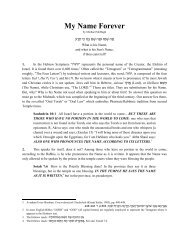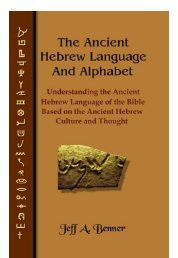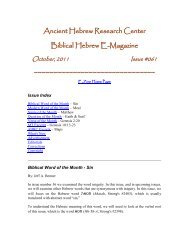Dating the Book of Job (PDF) - Ancient Hebrew Research Center
Dating the Book of Job (PDF) - Ancient Hebrew Research Center
Dating the Book of Job (PDF) - Ancient Hebrew Research Center
You also want an ePaper? Increase the reach of your titles
YUMPU automatically turns print PDFs into web optimized ePapers that Google loves.
<strong>Dating</strong> <strong>the</strong> <strong>Book</strong> <strong>of</strong> <strong>Job</strong> 19<br />
<strong>of</strong> <strong>the</strong> time had only 6 months. When one wants to be both accurate and brief, it is not uncommon,<br />
even today, to refer to spans <strong>of</strong> time using only <strong>the</strong> smaller units (e.g. It is not uncommon for a<br />
child <strong>of</strong> 1 year and 3 months to be referred to as a 15-month-old even though our modern calendar<br />
has only 12 months to its year).<br />
The next 5 sections <strong>of</strong> <strong>the</strong> biblical text which make reference to months beyond <strong>the</strong> 6th and<br />
before <strong>the</strong> time <strong>of</strong> king Solomon – Leviticus 16:29, 23:23-44, 25:9, and Numbers 29:1-12 – do<br />
so in <strong>the</strong> context <strong>of</strong> <strong>the</strong> religious ceremonies that were ordained by םיהלֹ ִ אֱ to be kept annually as a<br />
reminder <strong>of</strong> things past and/or a type <strong>of</strong> things to come.<br />
Consider what would happen if it were suddenly decided and decreed that our modern year<br />
was to be doubled from its current 12 months per cycle to 24 months per cycle. In particular,<br />
how would people continue to celebrate annual events like Christmas, Earth Day or whatever <strong>the</strong>y<br />
traditionally celebrated every 12 months? People are reluctant to change <strong>the</strong>ir long held traditions,<br />
so most would insist on continuing to hold <strong>the</strong> events every 12 months just as <strong>the</strong>y had always done.<br />
This would cause <strong>the</strong> events to be celebrated twice every 24-month year. What is important is how<br />
<strong>the</strong> doubled events would be distributed through <strong>the</strong> new 24-month year. What was celebrated on<br />
<strong>the</strong> 25th day <strong>of</strong> <strong>the</strong> 12th month before would, on <strong>the</strong> new calendar, be celebrated on <strong>the</strong> 25th day<br />
<strong>of</strong> <strong>the</strong> 12th and 24th months. Table 5 shows how <strong>the</strong> dates <strong>of</strong> <strong>the</strong> religious ceremonies recorded in<br />
<strong>the</strong> passages in question do show just such a doubled distribution. 11<br />
Table 5: Doubled Distribution <strong>of</strong> Holy Day Festivals<br />
Date (6m/yr) Date (12m/yr) Event<br />
1/10 1/10 sheep or goat chosen (Ex 12:3-5)<br />
1/14 1/14 8 Day Festival (1+7 – Ex 12:6-20)<br />
+50 +50 Feast <strong>of</strong> Weeks (Le 23:15-16)<br />
1/10 7/10 goats chosen (Le 16)<br />
1/14 7/15 8 Day Festival (7+1 – Le 23:33-36)<br />
+50 +50 Feast <strong>of</strong> Weeks [Wikipedia: Sigd]<br />
The situation is a bit more complex than just a doubling <strong>of</strong> <strong>the</strong> feasts though as can be seen by<br />
examining Exodus 23:14-17.<br />
– Three times you shall keep a feast to Me in <strong>the</strong> year: You shall keep <strong>the</strong> Feast <strong>of</strong> Unleavened Bread (you shall<br />
eat unleavened bread seven days, as I commanded you, at <strong>the</strong> time appointed in <strong>the</strong> month <strong>of</strong> Abib, for in it you<br />
came out <strong>of</strong> Egypt; none shall appear before Me empty); and <strong>the</strong> Feast <strong>of</strong> Harvest, <strong>the</strong> firstfruits <strong>of</strong> your labors<br />
which you have sown in <strong>the</strong> field; and <strong>the</strong> Feast <strong>of</strong> Inga<strong>the</strong>ring at <strong>the</strong> end <strong>of</strong> <strong>the</strong> year, when you have ga<strong>the</strong>red<br />
in <strong>the</strong> fruit <strong>of</strong> your labors from <strong>the</strong> field. Three times in <strong>the</strong> year all your males shall appear before <strong>the</strong> Lord<br />
GOD. (Exodus 23:14-17 NKJV)<br />
That <strong>the</strong> “Feast <strong>of</strong> Inga<strong>the</strong>ring” occurs at “<strong>the</strong> end <strong>of</strong> <strong>the</strong> year” is repeated in Exodus 34:22.<br />
Some confuse <strong>the</strong> Feast <strong>of</strong> Inga<strong>the</strong>ring (Exodus 23:16, 34:22) with <strong>the</strong> Feast <strong>of</strong> Tabernacles (Leviticus<br />
23:33-34, Deuteronomy 16:16), but <strong>the</strong> Feast <strong>of</strong> Tabernacles occurs in <strong>the</strong> middle <strong>of</strong> <strong>the</strong> 1st or<br />
7th month depending on what calendar you are using, nei<strong>the</strong>r <strong>of</strong> which is “<strong>the</strong> end <strong>of</strong> <strong>the</strong> year”.<br />
11 A festival 50 days after Atonement is still observed by Ethiopian Jews. [Wikipedia: Sigd]






